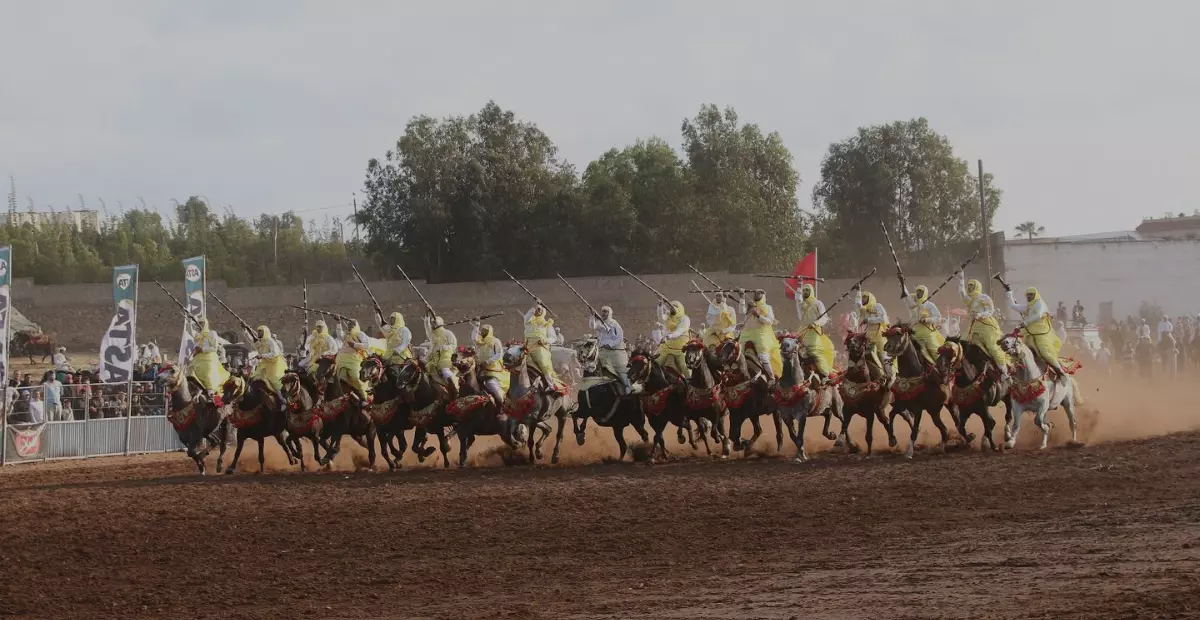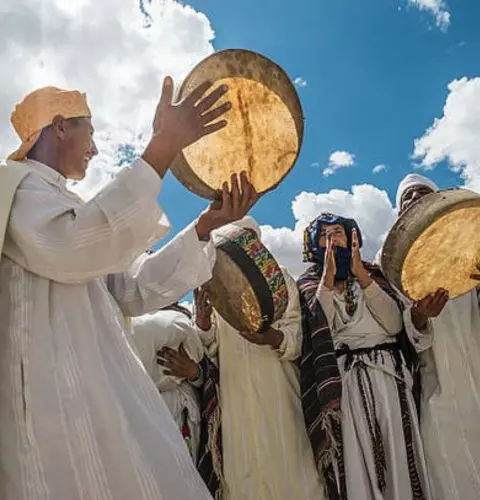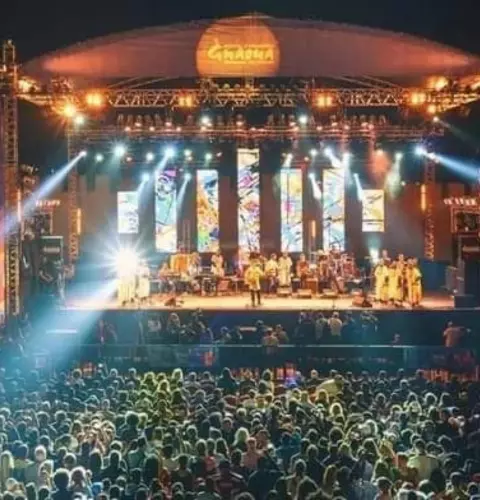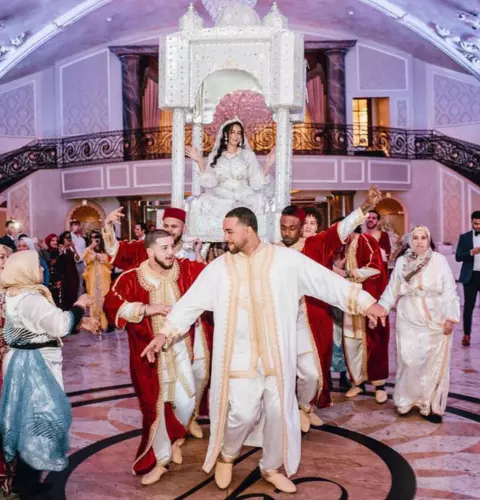
Blog
A Cultural Odyssey: Moroccan Traditions and Festivals
Morocco, a country rich in history and cultural diversity, is a refuge for tourists looking for a captivating cultural voyage. Every part of Moroccan traditions and festivals is unique, from the busy marketplaces of Marrakech to the peaceful oasis of the Sahara Desert. In this fascinating voyage, we will explore the vivid tapestry of Moroccan customs and dig into the beautiful world of its festivals, which will provide us with an insight into the heart and soul of this enthralling land.
- 1. Introduction
- 2. Exploring the Rich Cultural Tapestry of Morocco
- 3. The Enchanting World of Moroccan Traditions
- 4. Festivals Celebrating Morocco's Heritage
- 5. The Mesmerizing Moroccan Wedding Traditions
- 6. Cultural Diversity in the Atlas Mountains
- 7. Colors and Drums: The Fantasia Festivals
- 8. The Spiritual Essence of Moroccan Festivals
- 9. Moroccan Craftsmanship and Artisan Festivals
- 10. The Transcendent Sufi Festivals
- 12. Cultural Exchange at the Tan-Tan Moussem
- 13. The Majestic Rose Festival of El Kelaa M'gouna
- 14. Immerse Yourself in Moroccan Festivals
- 15. Conclusion
- 16. FAQs
- 1. Can I attend multiple festivals during my visit to Morocco?
- 2. Are Moroccan festivals family-friendly?
- 3. Are there any specific customs to be followed while attending Moroccan festivals?
- 4. Can I interact with locals during the festivals?
- 5. How can I best capture the essence of Moroccan festivals through photography?
- Plan an Entertaining Moroccan Holiday Now!
1. Introduction
Welcome to Marrakech, Morocco’s vivid and captivating “Red City.” While the souks and prominent sites draw people from all over the world, there is a world of hidden jewels awaiting intrepid travelers. In this tour, we will reveal Marrakech’s lesser-known wonders, giving you the opportunity to immerse yourself in the city’s rich history, culture, and natural beauty. Marrakech’s hidden beauties, from intriguing oases to architectural marvels, guarantee a genuinely memorable encounter.
2. Exploring the Rich Cultural Tapestry of Morocco
a. A Melting Pot of Traditions and Influences
Morocco’s rich cultural tapestry reflects the country’s historical connections with numerous cultures. Berber, Arab, Andalusian, and French influences have impacted the country’s traditions, resulting in a harmonic combination of cultures that makes Morocco genuinely distinct.
b. Morocco’s Vibrant Festivals: A Window into its Soul
Festivals in Morocco are more than simply spectacular spectacles; they provide a window into the nation’s spirit. Each celebration has great cultural value, sustaining age-old customs and fostering communal and religious relationships.
3. The Enchanting World of Moroccan Traditions
a. Time-Honored Customs and Rituals
Moroccan customs and rituals date back millennia and have been passed down through generations. Every custom, from the colorful henna ceremony at weddings to the art of storytelling, is a monument to Morocco’s rich cultural past.
b. Moroccan Music and Dance: A Rhythmic Celebration
Moroccan culture is dominated by music and dance. From the meditative Gnawa to the boisterous chaabi, the country’s many musical styles generate a sense of togetherness and excitement, bringing people together in celebration.
4. Festivals Celebrating Morocco’s Heritage
a. Ramadan: A Month of Fasting and Spiritual Reflection
Ramadan, the Islamic holy month of fasting, is very important in Morocco. It is a period of self-reflection, prayer, and charitable deeds that brings communities together in a common feeling of devotion.
b. Eid al-Fitr: The Joyous Celebration of Breaking the Fast
Eid al-Fitr celebrates the end of Ramadan with pleasure and feasting. Families gather to celebrate with lavish feasts and presents, establishing a sense of solidarity and giving.
c. Marrakech Popular Arts Festival: A Feast for the Senses
The Marrakech Popular Arts Festival celebrates Moroccan customs and traditions in a vivid way. Visitors are captivated by colorful processions, folk music, and dance performances, which provide a look into the country’s creative legacy.
d. Feast of Sacrifice (Eid al-Adha): A Time of Giving and Gratitude
Eid al-Adha, also known as the Feast of Sacrifice, celebrates Prophet Ibrahim’s (Abraham’s) willingness to sacrifice his son as an act of devotion to God. Animal sacrifice is performed by families, and the meat is handed to the less fortunate, emphasizing the principles of kindness and thankfulness.
5. The Mesmerizing Moroccan Wedding Traditions
a. The Henna Ceremony: An Artistic Ritual
Henna ceremonies are an important feature of Moroccan weddings. Intricate henna patterns are placed on the bride’s hands and feet, representing love, luck, and fertility.
b. The Wedding Procession: A Parade of Splendor
Moroccan weddings are elaborate affairs that might span several days. The bride and husband have carried on beautifully adorned chairs during the bridal procession, called “Laamariya,” while surrounded by happy music and dance.
c. Zina: The Display of Wealth and Generosity
“Zina” is a symbolic gesture highlighting the bride’s family’s riches and kindness. It includes the presentation of very expensive presents, such as traditional jewelry and fabrics, to the groom’s family.
6. Cultural Diversity in the Atlas Mountains
a. Berber Traditions: The Ancient Heart of Morocco
Morocco’s original people, the Berbers, have a rich cultural legacy that is strongly anchored in the Atlas Mountains. Their traditions, language, and crafts offer an intriguing peek into ancient Morocco.
b. The Imilchil Marriage Festival: A Gathering of Love
The Imilchil Marriage Festival, also known as the “Festival of Brides,” is a one-of-a-kind celebration of love and marriage that brings Berber clans together. It allows young individuals to meet potential life partners.
7. Colors and Drums: The Fantasia Festivals
a. Fantasia in Meknes: A Spectacular Equestrian Performance
Fantasia, also known as “Tbourida,” is a classic equestrian spectacle in which experienced horse riders gallop in tandem while shooting muskets into the air. It’s an incredible demonstration of bravery and horsemanship.
b. The Rhythmic Beats of the Gnaoua World Music Festival
Essaouira’s Gnaoua World Music Festival combines music, spirituality, and cultural interaction. Renowned musicians from throughout the world collaborate alongside Gnaoua musicians in spellbinding performances.
8. The Spiritual Essence of Moroccan Festivals
a. Moulay Idriss Zerhoun: A Pilgrimage of Faith
Moulay Idriss Zerhoun is significant religiously because it is the ultimate burial place of Moulay Idriss I, the founder of Morocco’s first Islamic monarchy. Pilgrims come to seek blessings and spiritual comfort.
b. Erfoud Date Festival: Honoring Morocco’s Staple Crop
The Erfoud Date Festival promotes the date palm, which is an important source of food for many Moroccans. It displays a variety of date products and honors the country’s agricultural history.
9. Moroccan Craftsmanship and Artisan Festivals
a. The Marrakech International Film Festival: A Glittering Affair
The Marrakech International Film Festival is a significant event that attracts world-renowned filmmakers and celebrities. It encourages cultural interchange while celebrating the craft of filmmaking.
b. The Asilah Arts Festival: A Canvas of Creativity
The Asilah Arts Festival turns Asilah’s seaside village into an open-air art exhibition. Murals and art installations are created by talented artists, bringing bursts of color to the town’s walls.
10. The Transcendent Sufi Festivals
a. The Fes Festival of World Sacred Music: A Harmonious Union
The Fes Festival of World Sacred Music is a musical and spiritual feast. Sufi musicians and artists from all origins join together to foster harmony and peace.
b. Guelmim Sufi Festival: Uniting Through Spirituality
The Guelmim Sufi Festival celebrates the tradition of Sufi saints while also encouraging spiritual harmony. Mystical performances, poetry readings, and ancient rituals are all part of it.
11. The Magical Circumcision Festivals
a. Moussem of Sidi Bel Abbès: A Mystical Celebration
The Moussem of Sidi Bel Abbès is an annual pilgrimage honoring the Sufi saint Sidi Bel Abbès. It is a religious gathering that includes prayers, singing, and devotion.
b. The Blessings of the Moussem of Moulay Idriss
The Moulay Idriss Moussem pays respect to Moulay Idriss II, who established Fes. Pilgrims assemble to seek blessings and take part in colorful processions.
12. Cultural Exchange at the Tan-Tan Moussem
a. Celebrating Saharan Traditions and Cultural Diversity
Tan-Tan Moussem is a vibrant celebration that honors Saharan customs and history. It is a lively display of the region’s cultural variety.
b. The Camel Race: A Thrilling Highlight
The Tan-Tan Moussem’s camel race is a highlight, with expert riders demonstrating their abilities in an exciting battle.
13. The Majestic Rose Festival of El Kelaa M’gouna
a. A Perfumed Oasis Amidst the Atlas Mountains
El Kelaa M’gouna’s Rose Festival takes place in the “Valley of Roses,” where fragrant roses blossom widely. The event is a visual and aromatic delight.
b. The Rose Parade and Traditional Music Performances
The Rose Festival features a vibrant parade, where locals dress in traditional attire and celebrate the beauty of the valley. Music performances and cultural activities add to the festivities.
14. Immerse Yourself in Moroccan Festivals
a. Tips for Attending Festivals in Morocco
Attending Moroccan festivals may be a life-changing event. We provide helpful hints to help you make the most of your festival experience. Just Contact US!
b. Capturing the Essence: Photography and Souvenirs
Preserve the memories of your Moroccan journey by photographing the spirit of festivals and purchasing unique gifts that showcase the country’s cultural diversity.
15. Conclusion
Set off on a cultural journey via the enchantment of Moroccan traditions and festivals. Each event, from the spiritual importance of Ramadan to the mesmerizing sounds of the Gnaoua World Music Festival, gives a look into the character of Morocco. Discover the warmth of its people, the vitality of its culture, and the rainbow of hues that decorate this stunning country.



16. FAQs
1. Can I attend multiple festivals during my visit to Morocco?
Yes, you may schedule your trip to coincide with several Moroccan events. Each festival provides a distinct experience that allows you to immerse yourself in various aspects of Moroccan traditions and festivals.
2. Are Moroccan festivals family-friendly?
Absolutely! Moroccan festivals are welcoming and family-friendly, with activities and entertainment for people of all ages.
3. Are there any specific customs to be followed while attending Moroccan festivals?
It is essential to observe local norms and dress modestly when attending festivals, especially during religious ceremonies. Accept the spirit of the occasion and be open to new customs.
4. Can I interact with locals during the festivals?
Interaction with locals is encouraged at festivals. Moroccans are recognized for their friendliness, and they are ready to share their customs and culture with visitors.
5. How can I best capture the essence of Moroccan festivals through photography?
Focus on the brilliant colors, exquisite details, and enthusiastic reactions of participants to capture the spirit of Moroccan traditions and festivals. Before taking photographs, respect people’s privacy and obtain their permission.
Arhhal
Moroccan Travel Expert
Plan an Entertaining Moroccan Holiday Now!
We can help you fit your stay and experience within your allotted budget.
